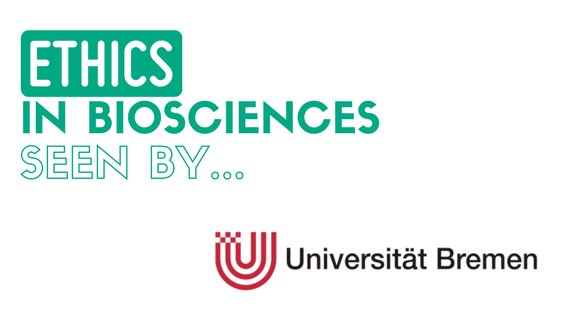
University of Bremen – Faculty of Biology & Chemistry
Dr. Doris Elster – Head of the Department of Biology Education at the Institute of Science Education.
-
How do you understand Ethics in biosciences research?
The term “research ethics” comprises a set of values, norms and institutional regulations that support and regulate scientific activities. Research has a fundamental ethos, namely the search for truth. At the same time, research ethics emphasizes that research has a – more general -responsibility for the society. In this area of tension between researcher’s curiosity and responsibility towards humans and the environment research ethics in biosciences occurs.
-
What are the current standards and actions to achieve better Ethics in the University of Bremen?
At the University of Bremen ethical issues are determined within the “Regulations assuring good scientific practice” (German Research Association) and complied within the “Principles of good scientific practice”, adopted by the Academic Senate on February 23, 2002. The nine members of the “Committee for the Investigation of Allegations of Scientific Misconduct” are elected by the Academic Senate of the University of Bremen and investigate and evaluate any concrete suspicion of scientific misconduct.
-
What are you aiming for with the implementation of the STARBIOS2 actions towards better Ethics standards for the Faculty Biology and Chemistry at the University of Bremen?
Our aim is to raise awareness of ethical issues in general and to promote good research practice based on already existing and guidelines as well as further specific guidelines for the biosciences. At the University of Bremen, the values and principles of good scientific practice are based on truth, fidelity and respect for persons. The individual researcher is responsible for exercising honest research practices; he or she is individually responsible for the activities, the subject matter and method as well as for the quality of the results. In addition, the researcher has to respect and outline the contributions of other researchers and follow standards for authorship and cooperation.
Our specific aim in biosciences research is to raise awareness of ethical issues in accordance with sustainable development, respect for living beings and the environment. In the specific field of “nanobiotechnology” the researcher must take care to clarify the extent of the results’ certainty and validity, as well as indicate any elements of risk or uncertainty that may have consequences for health, society or the environment.
-
What kind of actions are you going to establish to fulfill these objectives?
To raise the awareness of students and researchers in respect to ethical issues we have decided to take a number of steps. At the first stage, we will conduct a state-of-the art analysis based on a literature recherché, guided interviews with members of different focus groups (students, PhD student, postdoctoral researchers, and researchers) to identify attitudes, needs, ethical implications and existing measures at the faculty. Based on the interview analysis we will conduct an online questionnaire survey to get a broader data basis. Based on the results we will deduce a first draft of recommendations.
At the second stage we will discuss and negotiate the first draft of recommendations with important stakeholders at the faculty and members of different focus groups. Our goal is to provide these recommendations with academic teaching aids to include both, general elements and specific (modular) elements suitable to the various fields of research at the faculty (such as protection of animals in research, responsibility and nanobiotechnology, and educational research).
At the third stage we will develop, test and evaluate specific building blocks as elements of an academic training program. This building blocks will be tailored to the individual needs of researchers of different career levels.
In stage 4, based on the results of the evaluation we will deduce a final version of recommendations and training elements about ethical issues and negotiate them with important stakeholders and members of the focus groups. The findings will become part of a RRI mission statement of the faculty biology and chemistry. (The whole process see figure 1)

Figure 1. Process of raising awareness of ethical issues in biosciences research
-
Who is involved, from University of Bremen in the action plan in order to complete the final objectives?
The STARBIOS2 steering team of the Institute of Science Education, Department Biology Didactics, is responsible for conducting the state-of-the art analysis, the interviews and questionnaire survey. The recommendations will be discussed and negotiated within the Core Team, natural scientists of ecology, neurobiochemistry, sustainable chemistry, and molecular biology, social scientists of philosophy, science educators and members of the faculty-intern quality control group. In addition, members of the focus group doctoral students (with eight members), the focus group students (with eight members), and the focus group advanced researchers (with four members) participate in and contribute to the RRI mission statement development.







